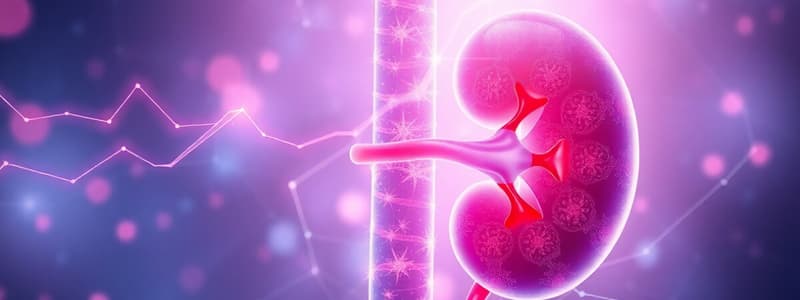Podcast
Questions and Answers
What is the primary purpose of the creatinine clearance test (CrCl)?
What is the primary purpose of the creatinine clearance test (CrCl)?
To provide a better estimation of kidney function than other tests.
What factors can influence the calculation of creatinine clearance?
What factors can influence the calculation of creatinine clearance?
Sex, age, weight, and race.
How does high creatinine concentration in urine relate to drug tests?
How does high creatinine concentration in urine relate to drug tests?
High creatinine levels indicate a pure test sample.
What is creatinine and how is it produced in the body?
What is creatinine and how is it produced in the body?
Why is creatinine considered a common indicator of kidney function?
Why is creatinine considered a common indicator of kidney function?
Under what circumstances might a doctor order a creatinine blood test?
Under what circumstances might a doctor order a creatinine blood test?
What role does urine creatinine concentration play in detecting test integrity?
What role does urine creatinine concentration play in detecting test integrity?
What does a depressed level of plasma creatinine indicate?
What does a depressed level of plasma creatinine indicate?
What is creatinine and how is it produced in the body?
What is creatinine and how is it produced in the body?
Explain the main role of the kidneys in relation to creatinine.
Explain the main role of the kidneys in relation to creatinine.
What does an increase in serum creatinine levels indicate?
What does an increase in serum creatinine levels indicate?
How can creatinine clearance (CrCl) be calculated and what does it reflect?
How can creatinine clearance (CrCl) be calculated and what does it reflect?
What factors can affect the accuracy of GFR estimates in renal dysfunction?
What factors can affect the accuracy of GFR estimates in renal dysfunction?
Why might men have higher serum creatinine levels than women?
Why might men have higher serum creatinine levels than women?
What does a raised BUN-to-creatinine ratio suggest?
What does a raised BUN-to-creatinine ratio suggest?
What is the significance of measuring serum creatinine in clinical practice?
What is the significance of measuring serum creatinine in clinical practice?
What are some common symptoms of kidney problems?
What are some common symptoms of kidney problems?
Name two diseases associated with kidney inflammation.
Name two diseases associated with kidney inflammation.
What is the primary method by which creatinine is removed from the blood?
What is the primary method by which creatinine is removed from the blood?
How can blood creatinine concentrations relate to kidney function?
How can blood creatinine concentrations relate to kidney function?
What could increased blood creatinine levels indicate?
What could increased blood creatinine levels indicate?
Which demographic factors can lead to decreased creatinine levels?
Which demographic factors can lead to decreased creatinine levels?
What is the best test to measure kidney function?
What is the best test to measure kidney function?
List one condition that might cause a decrease in blood creatinine concentration.
List one condition that might cause a decrease in blood creatinine concentration.
What is GFR, and why is a normal range considered important for kidney function?
What is GFR, and why is a normal range considered important for kidney function?
Explain the importance of urine creatinine (Ucr) in calculating GFR.
Explain the importance of urine creatinine (Ucr) in calculating GFR.
Describe the procedure for measuring serum creatinine concentration using the Jaffe reaction.
Describe the procedure for measuring serum creatinine concentration using the Jaffe reaction.
What factors influence the rate of substance elimination in the urine?
What factors influence the rate of substance elimination in the urine?
What happens to GFR as people age, and what is a typical value for adults over time?
What happens to GFR as people age, and what is a typical value for adults over time?
Flashcards are hidden until you start studying
Study Notes
Creatinine
- Is a breakdown product of creatine phosphate in muscle
- Produced at a fairly constant rate, dependent on muscle mass
- Synthesized in the liver, kidney, and pancreas from three amino acids: arginine, glycine, and methionine
- 1-2% of creatine is spontaneously converted to creatinine daily
- Filtered by the kidneys via glomerular filtration and proximal tubular secretion
- Little to no tubular reabsorption occurs
Creatinine Blood Test
- Used to assess creatinine levels
- Ordered if a patient shows signs of kidney disease
- Elevation indicates an under-excretion, suggesting kidney impairment
- Depressed levels are rare and not clinically significant
Creatinine and Kidney Function
- A major indicator of glomerular filtration rate (GFR) and renal function
- Creatinine blood and urine levels can be used to calculate the creatinine clearance (CrCl), which reflects the GFR
- In severe renal dysfunction, CrCl may be overestimated due to active creatinine secretion
- Ketoacidosis, cimetidine, and trimethoprim reduce creatinine tubular secretion, improving the accuracy of GFR estimates in severe dysfunction
- In the absence of secretion, creatinine acts similarly to insulin
- A complete assessment of kidney function is gained by interpreting creatinine levels in blood (plasma) alongside urea levels
BUN-to-Creatinine Ratio
- BUN stands for Blood Urea Nitrogen
- Indicates problems beyond the kidney
- An elevated urea level disproportionate to creatinine may suggest a pre-renal problem like volume depletion
- Men typically have higher creatinine levels because they have more skeletal muscle mass
- Vegetarians have lower creatinine levels
Blood Creatinine Concentration
- A rise in blood creatinine level only occurs with significant damage to functioning nephrons
- A simple and common test for assessing renal function
- Normal values:
- Male: 0.6-1.2 mg/dL
- Female: 0.5-1.0 mg/dL
Symptoms of Increased Blood Creatinine
- Fatigue and trouble sleeping
- Loss of appetite
- Swelling in the face, wrists, ankles, or abdomen
- Lower back pain near the kidneys
- Changes in urine output and frequency
- High blood pressure
- Nausea
- Vomiting
Causes of Increased Blood Creatinine
- Impaired renal function
- Chronic nephritis
- Urinary tract obstruction
- Muscle disease (e.g., muscular dystrophy, poliomyelitis)
- Congestive heart failure
- Shock
- Dehydration
- Rhabdomyolysis
Causes of Decreased Blood Creatinine
- Small stature
- Decreased muscle mass
- Advanced and severe liver disease
- Pregnancy
Creatinine Clearance
- Measured by a volume of plasma from which a measured amount of substance can be completely eliminated in the urine per unit of time
- The best test to measure kidney function and determine the stage of kidney disease
- Depends on:
- Plasma concentration
- Excretory rate
- Glomerular filtration rate (GFR)
- Renal plasma flow (RPF)
- Normal GFR: >90 ml/min in adults
- GFR declines with age, even in healthy individuals, reaching 70 ml/min
- GFR = Ucr/Scr * UV, where:
- Ucr = Urine creatinine
- Scr = Serum creatinine
- UV = Urine volume expressed in ml/min
Creatinine Measuring Principle
- Colorimetric reaction (Jaffe reaction) of creatinine with alkaline picrate is measured kinetically at 505 nm
Creatinine Clearance Procedure
- Blank: 1 mL reagent
- Sample: 1 mL reagent, 100 µL sample
- Standard: 1 mL reagent, 100 µL standard
- Mix well, record absorbance A1 at 505 nm against reagent blank after 30 seconds
- Record absorbance A2 at 505 nm 90 seconds after the first reading
- Calculation: Concentration of serum creatinine = ((A2-A1) - AB) / ((A2-A1) - AB) * Concentration of standard
Studying That Suits You
Use AI to generate personalized quizzes and flashcards to suit your learning preferences.




